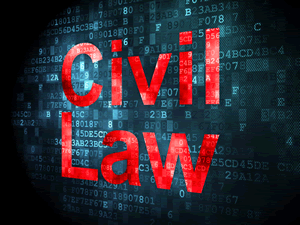Can I file a complaint or criminal charges against my lawyer?
Recently on our legal forum a user asked, “I have a lawyer who has committed what might be a criminal action against me. I am wondering what options I have to file criminal charges or at least to file a complaint? Who do I talk to and what is the first step I should take?”
Professional conduct and your lawyer
Lawyers are governed by a strict code of conduct. Rules of conduct have been established and adopted primarily by the American Bar Association (ABA), which is the largest professional association for attorneys. Although this organization is comprised of attorneys and judges and is therefore largely self-governing, lawyers and judges who violate rules adopted through the Practice of Law can be reprimanded, suspended, publically censured, or even disbarred.
Common rules which are included in the Model Rules of Professional Conduct include the following:
- Committing a criminal action
- Engaging in dishonesty, fraud, deceit, or misrepresentation
- Engaging in actions to influence improperly a government official
- Engaging in conduct which is prejudicial to the administration of justice
Where do I file a complaint against my lawyer?
So what do you do if your lawyer or the opposing counsel engaged in an action or activity which you have determined is against the code of conduct for lawyers in your state? You can file a complaint with the overseeing entity in your state. Complaints against lawyers, however, can be handled by different governing bodies in different states. For example, some states will allow a certain division of courts (i.e., disciplinary board) to hear the cases, while other states will have the state bar association hear the cases.
What will the disciplinary board do to the lawyer?
Although each state handles disciplinary actions against a lawyer a bit differently, each state will review the complaints, determine if the complaint should be investigated, and if yes, complete the investigation.
In some cases, the lawyer may have to attend a hearing to defend themselves against the complaint charges. If the board determines the attorney is at fault they will punish them. Disciplinary actions can include fines, community service, suspension of license, or disbarment.
Can I file a malpractice case?
Another option, which you did not mention but which might be appropriate, is to file a legal malpractice claim against your lawyer. A legal malpractice lawsuit is a civil claim that you can file if you have evidence that your lawyer was intentionally or unintentionally negligent, breached their fiduciary duty, or breached their contract.
Common reasons malpractice claims have been filed include:
- Not filing a lawsuit prior to the statute of limitations
- Not preparing for trial
- Not following orders from the court
- Having an improper sexual relationship with the defendant or plaintiff
- Not telling disclosing settlement offers
- Misusing case funds
Keep in mind, winning a legal malpractice case can be very tough. Not only will you have to prove your lawyer had a duty to competently represent you, they breached their duty, and you were injured by the breach, you will also have to prove that you would have won your case if your lawyer had not been negligent and you would have collected judgment for the initial case.
Additionally, you should expect to pay a hefty fee to hire a malpractice lawyer to represent you. In fact, they may charge as high as 40% or 50% of the compensation won from the malpractice claim.
Can I ask the state to file charges against my lawyer?
In some cases, a lawyer’s actions might move from minor actions of negligence or misconduct to criminal actions. For example, if your lawyer attacked and sexually assaulted you or physically injured you, you would need to call the police instead of or in addition to filing a complaint with the American Bar Association.
Whether your attorney would be immediately arrested depends on whether the state could gather sufficient evidence and establish probable cause that a crime had been committed.
For example, if you were attacked by your lawyer and you contacted the police the police would come to the scene of the crime, ask you about the attack, and determine if there was probable cause to arrest your lawyer. Probable cause can include your testimony, witness testimony, physical evidence, evidence of injuries, and video or audio of the attack.
If your lawyer had fled the scene and the police had sufficient evidence that an attack had occurred, they would obtain an arrest warrant, find the lawyer, and arrest him.
Bottom Line:
The type of legal action you can take against your lawyer will depend on the offense committed and whether it was an unethical, civil, or criminal violation.
Related Pages
Previous Question
Can emergency room personnel hold you against your will?Next Question
Can I file a malpractice claim against my lawyer?Latest Question
Being sued by a hospital
There are several steps you need to take immediately if you have been sued for medical debts
Category: Injury Law



